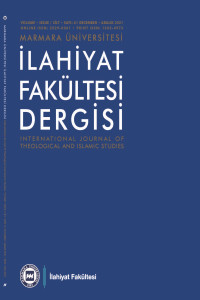Zekeriyya b. İsmail el-Yûsufî. el-Cevâbü’l-Latîf alâ Kitâbi’ş-Şeyh Muhammed Avvâme Hükmü’l-ameli bi’l-hadîsi’d-daîf. Kahire: Merkezü İhyâ li’l-Buhûs ve’d-Dirâsât, 1441/2020, 416 sayfa.
Abstract
Hadis usulünün güncelliğini koruyan konularından biri olan zayıf hadisin amele kaynaklığı ve şer‘î delil oluşuyla ilgili tartışmalara Hükmü’l-amel bi’l-hadîsi’d-daîf beyne’n-nazariyye ve’t-tatbîk ve’d-daʻvâ adlı eseriyle katılan Muhammed Avvâme’ye göre mütekaddim âlimler zayıf hadisle ameli caiz, hatta müstehap görürler, zayıf hadisler kitaplara sadece nakletmek için değil amel edilmek için de kaydedilmiştir. İlk defa Şevkânî (ö. 1834) tarafından dillendirilen “zayıfla hiçbir şekilde amel edilemeyeceği” görüşünün Sıddîk Hasan Han (ö. 1890), Tâhir el-Cezâirî (ö. 1920), Ahmed Muhammed Şâkir (ö. 1958) ve Elbânî (ö. 1999) ile devam ettirildiğini belirten Avvâme, çalışmasında mütekaddim âlimlerin yolunu takip ederek “muasırların hatalı görüşleri”nden sakınacağını söyler.
References
- Zekeriyya b. İsmail el-Yûsufî. el-Cevâbü’l-Latîf alâ Kitâbi’ş-Şeyh Muhammed Avvâme Hükmü’l-ameli bi’l-hadîsi’d-daîf. Kahire: Merkezü İhyâ li’l-Buhûs ve’d-Dirâsât, 1441/2020, 416 sayfa.
Zekeriyya b. İsmail el-Yûsufî. el-Cevâbü’l-Latîf alâ Kitâbi’ş-Şeyh Muhammed Avvâme Hükmü’l-ameli bi’l-hadîsi’d-daîf. Kahire: Merkezü İhyâ li’l-Buhûs ve’d-Dirâsât, 1441/2020, 416 sayfa.
Abstract
Hükmü'l-amel bi'l-hadîsi'd-daîf beyne'n-nazariyye ve't-tatbîk ve'd-daʻvâ discusses the debate about the weak hadith, which is one of the subjects of the hadith method, which is still up-to-date, and its being a religious evidence. According to Muhammad Avvâme, who participated in the study, advanced scholars consider it permissible and even recommended to do with weak hadiths, weak hadiths are recorded in books not only for transmission but also for practice. The view that "weakness cannot be acted upon in any way", first voiced by Şevkani (d. 1834), is supported by Siddik Hasan Han (d. 1890), Tahir al-Cezâirî (d. 1920), Ahmed Muhammed Şakir (d. 1958) and Elbânî (d. 1999), Avvâme says that he will avoid “the wrong views of the contemporaries” by following the path of the previous scholars in his work.
References
- Zekeriyya b. İsmail el-Yûsufî. el-Cevâbü’l-Latîf alâ Kitâbi’ş-Şeyh Muhammed Avvâme Hükmü’l-ameli bi’l-hadîsi’d-daîf. Kahire: Merkezü İhyâ li’l-Buhûs ve’d-Dirâsât, 1441/2020, 416 sayfa.
Details
| Primary Language | Turkish |
|---|---|
| Journal Section | Book Review |
| Authors | |
| Publication Date | December 16, 2021 |
| Published in Issue | Year 2021 Volume: 61 Issue: 61 |
Cite
International Journal of Theological and Islamic Studies
International Journal of Theological and Islamic Studies is an open access journal
Click for Open Access Policy

